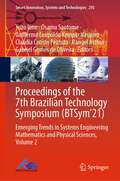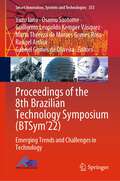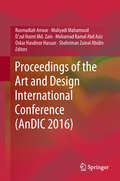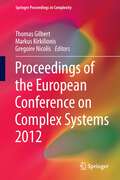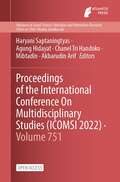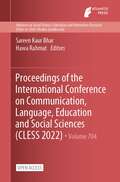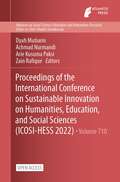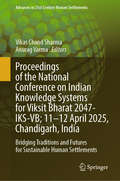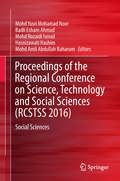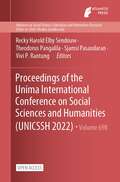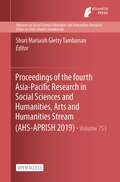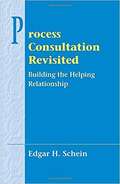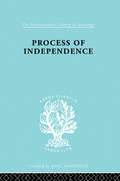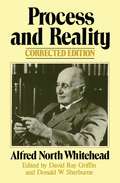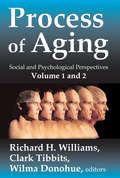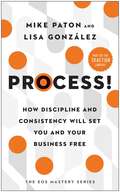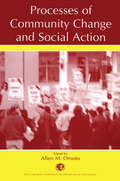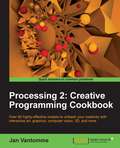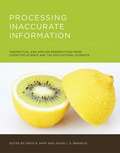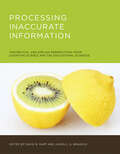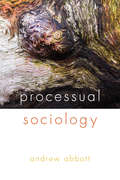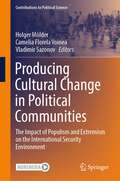- Table View
- List View
Proceedings of the 7th Brazilian Technology Symposium: Emerging Trends in Systems Engineering Mathematics and Physical Sciences, Volume 2 (Smart Innovation, Systems and Technologies #295)
by Yuzo Iano Rangel Arthur Osamu Saotome Gabriel Gomes de Oliveira Guillermo Leopoldo Kemper Vásquez Claudia Cotrim PezzutoThis book presents the Proceedings of The 7th Brazilian Technology Symposium (BTSym'21). The book discusses current technological issues on Systems Engineering, Mathematics and Physical Sciences, such as the Transmission Line, Protein-modified mortars, Electromagnetic Properties, Clock Domains, Chebyshev Polynomials, Satellite Control Systems, Hough Transform, Watershed Transform, Blood Smear Images, Toxoplasma Gondi, Operation System Developments, MIMO Systems, Geothermal-Photovoltaic Energy Systems, Mineral Flotation Application, CMOS Techniques, Frameworks Developments, Physiological Parameters Applications, Brain Computer Interface, Artificial Neural Networks, Computational Vision, Security Applications, FPGA Applications, IoT, Residential Automation, Data Acquisition, Industry 4.0, Cyber-Physical Systems, Digital Image Processing, Patters Recognition, Machine Learning, Photocatalytic Process, Physical-chemical analysis, Smoothing Filters, Frequency Synthesizers, Voltage Controlled Ring Oscillator, Difference Amplifier, Photocatalysis, Photodegradation, current technological issues on Human, Smart and Sustainable Future of Cities, such as the Digital Transformation, Data Science, Hydrothermal Dispatch, Project Knowledge Transfer, Immunization Programs, Efficiency and Predictive Methods, PMBOK Applications, Logistics Process, IoT, Data Acquisition, Industry 4.0, Cyber-Physical Systems, Fingerspelling Recognition, Cognitive Ergonomics, Ecosystem services, Environmental, Ecosystem services valuation, Solid Waste and University Extension.
Proceedings of the 8th Brazilian Technology Symposium: Emerging Trends and Challenges in Technology (Smart Innovation, Systems and Technologies #353)
by Yuzo Iano Rangel Arthur Osamu Saotome Gabriel Gomes de Oliveira Guillermo Leopoldo Kemper Vásquez Maria Thereza de Moraes Gomes RosaThis book presents the proceedings of the 8th Brazilian Technology Symposium (BTSym'22). The book discusses current technological issues on Systems Engineering, Mathematics, and Physical Sciences, such as the Transmission Line, Protein-Modified Mortars, Electromagnetic Properties, Clock Domains, Chebyshev Polynomials, Satellite Control Systems, Hough Transform, Watershed Transform, Blood Smear Images, Toxoplasma Gondi, Operation System Developments, MIMO Systems, Geothermal-Photovoltaic Energy Systems, Mineral Flotation Application, CMOS Techniques, Frameworks Developments, Physiological Parameters Applications, Brain–Computer Interface, Artificial Neural Networks, Computational Vision, Security Applications, FPGA Applications, IoT, Residential Automation, Data Acquisition, Industry 4.0, Cyber-Physical Systems, Digital Image Processing, Patters Recognition, Machine Learning, Photocatalytic Process, Physical-Chemical Analysis, Smoothing Filters, Frequency Synthesizers, Voltage Controlled Ring Oscillator, Difference Amplifier, Photocatalysis, and Photodegradation, and current technological issues on Human, Smart, and Sustainable Future of Cities, such as the Digital Transformation, Data Science, Hydrothermal Dispatch, Project Knowledge Transfer, Immunization Programs, Efficiency and Predictive Methods, PMBOK Applications, Logistics Process, IoT, Data Acquisition, Industry 4.0, Cyber-Physical Systems, Fingerspelling Recognition, Cognitive Ergonomics, Ecosystem Services, Environmental, Ecosystem Services valuation, Solid Waste, and University Extension.
Proceedings of the Art and Design International Conference (AnDIC #2016)
by Oskar Hasdinor Hassan Shahriman Zainal Abidin Rusmadiah Anwar Muliyadi Mahamood D'zul Haimi Md. Zain Mohamad Kamal Abd AzizThis book of conference proceedings contains papers presented at the Art and Design International Conference (AnDIC 2016). It examines the impact of Cyberology, also known as Internet Science, on the world of art and design. It looks at how the rapid growth of Cyberology and the creation of various applications and devices have influenced human relationships. The book discusses the impact of Cyberology on the behaviour, attitudes and perceptions of users, including the way they work and communicate. With a strong focus on how the Cyberology world influences and changes the methods and works of artists, this book features topics that are relevant to four key players - artists, intermediaries, policy makers, and the audience - in a cultural system, especially in the world of art and design. It examines the development, problems and issues of traditional cultural values, identity and new trends in contemporary art. Most importantly, the book attempts to discuss the past, present and future of art and design whilst looking at some underlying issues that need to be addressed collectively.
Proceedings of the European Conference on Complex Systems 2012
by Gregoire Nicolis Markus Kirkilionis Thomas GilbertThe European Conference on Complex Systems, held under the patronage of the Complex Systems Society, is an annual event that has become the leading European conference devoted to complexity science. ECCS'12, its ninth edition, took place in Brussels, during the first week of September 2012. It gathered about 650 scholars representing a wide range of topics relating to complex systems research, with emphasis on interdisciplinary approaches. More specifically, the following tracks were covered: 1. Foundations of Complex Systems 2. Complexity, Information and Computation 3. Prediction, Policy and Planning, Environment 4. Biological Complexity 5. Interacting Populations, Collective Behavior 6. Social Systems, Economics and Finance This book contains a selection of the contributions presented at the conference and its satellite meetings. Its contents reflect the extent, diversity and richness of research areas in the field, both fundamental and applied.
Proceedings of the First International Conference on Advanced Robotics, Control, and Artificial Intelligence: ICARCAI 2024, 9–12 December, Perth, Australia (Lecture Notes in Networks and Systems #1376)
by Hai WangThis book highlights the latest research developments and outcomes on all aspects of advanced robotics, control and artificial intelligence. Particularly, it not only includes those emerging methodologies and techniques which bridge theoretical studies and applications in all robotics and control systems as well as artificial intelligence, but also involves the practical concerns and challenges encountered and potential solutions in those fields.
Proceedings of the International Conference On Multidisciplinary Studies (Advances in Social Science, Education and Humanities Research #751)
by Haryani Saptaningtyas Agung Hidayat Chanel Tri Handoko Mibtadin Akbarudin ArifThis is an open access book. 1st International Conference on Multidisciplinary Studies (ICoMSi) offers a track of quality R&D from key researchers and experts. It provides an opportunity in bringing in the new hope and horizons that will contribute to Advanced research and policy on Culture, Environment, Health, and Community Development after pandemic. All submitted papers will be under peer review and accepted papers will be published in the conference proceeding. Both academia, activists and industries are invited to present their papers dealing with state-of-art research, sustainable developments, and goods practices of community development after pandemic.
Proceedings of the International Conference on Communication, Language, Education and Social Sciences (Advances in Social Science, Education and Humanities Research #704)
by Sareen Kaur Bhar Hawa RahmatThis is an open access book.The 3rd International Conference on Communication, Language, Education and Social Sciences (CLESS 2022) will be held on 25-27 July 2022. This year’s conference will be a part of the bigger Digital Future Congress (DIFCON) comprising of various other conferences in different fields and will be held online. CLESS 2022 is unique in which it combines communication, language, education, and social science in an international academic conference. The aim of CLESS 2022 is to offer a platform for both local and international academics, educators, researchers and other professionals to meet, share and discuss latest research, trends, ideas and innovation in the field of communication, language, education, psychology and social sciences. The conference is aimed to provide a platform for young researchers as well as to support and encourage other researchers to present their research, to network within the international community of researchers and to share and seek the insight and advice of successful senior researchers all over the world during the conference.
Proceedings of the International Conference on Sustainable Innovation on Humanities, Education, and Social Sciences (Advances in Social Science, Education and Humanities Research #710)
by Dyah Mutiarin Achmad Nurmandi Arie Kusuma Paksi Zain RafiqueThis is an open access book.This proceeding consists of research presented in ICOSI UMY, on 20-21 July 2022 at Universitas Muhammadiyah Yogyakarta. The conference covers the topic of governance, international relations, law, education, humanities, and social sciences. The COVID-19 pandemic first time that occurred in 2019, has brought many changes that constrain all countries to adapt quickly. The crisis has shown vulnerabilities and gaps in several primary systems, including healthcare, social protection, education, value chains, production networks, financial markets, and the ecosystem.One of the efforts that each country can take to rise from the COVID-19 pandemic is through strengthening multilateralism, international solidarity, and global partnerships. Hence, this conference raises the central theme “Strengthening Global Partnership for Resilience.” This theme covers sub-themes that allow prospective scholars to submit their papers for ‘Virtual Conferences’ presentation under the following scopes: Social Sciences, Humanities, Educations, and Religious Studies. Presented papers will also get a chance to be published in our remarkable partner publishers. Through the International Symposium on Social, Humanities, Education, and Religious Studies (ISSHERS) and Asian Conference on Comparative Laws (Asian-COL), we hope that participants will express their innovative and creative ideas to provide benefits and contribute knowledge to strengthen global partnerships among countries.Finally, all 75 papers published in this proceedings are expected not only as research output but can be developed further into prototypes or evidence for policy making.
Proceedings of the International Seminar on Language, Education, and Culture (Advances in Social Science, Education and Humanities Research #742)
by Yazid Basthomi Maria Hidayati Dewi Kartika Utami Widiati Suharyadi Anik Nunuk WulyaniThis is an open access book.Hosted by Faculty of Letters, Universitas Negeri Malang, it is an annual International Seminar on Language, Education, and Culture held to gather researchers, practitioners, teachers, and students to identify and share various aspects in language, education, and culture.Theme: Embracing Changes and Innovations in Language, Education, Art, and Culture in Post-Pandemic LifeSubthemes: Changes and Innovations in Language, Education, and CultureChanges and Innovations in Literature and ArtOnline Teaching and Learning PracticesCorpus-Based Language, Teaching and ResearchLanguage in MediaGender and IdentityPop, Contemporary and Digital CultureCulture and SpiritualityMultilingualism and TranslanguagingVisual and Performing ArtsOral Tradition & Local CultureDigital Literacy and Information Science
Proceedings of the National Conference on Indian Knowledge Systems for Viksit Bharat 2047-IKS-VB; 11–12 April 2025, Chandigarh, India: Bridging Traditions and Futures for Sustainable Human Settlements (Advances in 21st Century Human Settlements)
by Anurag Varma Vikas Chand SharmaThis book includes peer reviewed articles from the IKS for Viksit Bharat 2047 (IKS-VB) held on 11-12 April 2025 at Chandigarh in India. It presents how the Indian Knowledge Systems (IKS) can be practically applied to create sustainable and harmonious human settlements. It addresses the critical challenges of modern urban and rural development by showcasing indigenous solutions for environmental conservation, governance, and socio-cultural preservation. By drawing upon ancient wisdom from Vastu Shastra, traditional ecological knowledge, and time-honored governance principles, this work provides innovative strategies for building resilient and sustainable communities. In alignment with the ethos of balancing development with cultural and ecological integrity, the book aspires to cultivate a harmonious coexistence between human progress and the preservation of our natural and cultural heritage, ensuring the long-term vitality and sustainability of human habitats.
Proceedings of the Regional Conference on Science, Technology and Social Sciences: Social Sciences (RCSTSS #2016)
by Badli Esham Ahmad Mohd Yusri Mohamad Noor Mohd Rozaidi Ismail Hasnizawati Hashim Mohd Amli Abdullah BaharumThis book features papers addressing a broad range of topics including psychology, religious studies, natural heritage, accounting, business, communication, education and sustainable development. It serves as a platform for disseminating research findings by academicians of local, regional and global prominence, and acts as a catalyst to inspire positive innovations in the development of the region. It is also a significant point of reference for academicians and students. This collection of selected social sciences papers is based on the theme “Soaring Towards Research Excellence”, presented at the Regional Conference of Sciences, Technology and Social Sciences (RCSTSS 2016), organised bi-annually by Universiti Teknologi MARA Cawangan Pahang, Malaysia.
Proceedings of the Second International Conference on the Future of ASEAN (ICoFA) 2017 – Volume 2: Science And Technology
by Rizauddin Saian Mohd Azwan AbbasThis book examines how business, the social sciences, science and technology will impact the future of ASEAN. Following the ASEAN VISION 2020, it analyses the issues faced by ASEAN countries, which are diverse, while also positioning ASEAN as a competitive entity through partnerships. On the 30th anniversary of ASEAN, all ASEAN leaders agreed to the establishment of the ASEAN VISION 2020, which delineates the formation of a peaceful, stable and dynamically developed region while maintaining a community of caring societies in Malaysia, Indonesia, Singapore, Brunei, Vietnam, Thailand, the Philippines, Myanmar, Laos and Cambodia. In keeping with this aspiration, Universiti Teknologi MARA Perlis took the initial steps to organise conferences and activities that highlight the role of the ASEAN region. The Second International Conference on the Future of ASEAN (ICoFA) 2017 was organised by the Office of Academic Affairs, Universiti Teknologi MARA Perlis, to promote more comprehensive integration among ASEAN members. This book, divided into two volumes, offers a useful guide for all those engaged in research on business, the social sciences, science and technology. It will also benefit researchers worldwide who want to gain more knowledge about ASEAN countries
Proceedings of the Unima International Conference on Social Sciences and Humanities (Advances in Social Science, Education and Humanities Research #698)
by Recky Harold Elby Sendouw Theodorus Pangalila Sjamsi Pasandaran Vivi P. RantungThis is an open access book. The Unima International Conference on Social Sciences and Humanity (UNICSSH) 2022 was conducted on October, 11th – 13th 2022, at The Grand Kawanua International City, Manado, North Sulawesi, Indonesia.In 2022, Universitas Negeri Manado will host the Indonesian National Education Convention (KONASPI) X. Konaspi is a routine activity of the PPTKN which is held once every four years. The fourth industrial revolution (4.0) is marked by technological advances and supported by artificial intelligence that creates opportunities and challenges for the education system. University and vocational school graduates are facing a world transformed by technology which in turn is transforming the workplace from task-based to human-centered characteristics. Certain skills such as critical thinking, emotional intelligence, problem-solving, cognitive flexibility, and knowledge production are required. To answer this demand, the education system must put revolutionary innovation on its agenda. Scholars, researchers, and practitioners are invited to share ideas, research results, and best practices about education, science, and technology now and in the future at an international conference held by Universitas Negeri Manado as part of the Indonesian National Education Convention (KONASPI). As part of KONASPI X activities, Universitas Negeri Manado is holding the 2022 International Conference on Education, Social Science, and Humanities (ICESSHum). The topics in this international conference are Education, Law, Politics and Social Sciences, Economics, Public Administration, and Humanities. Through these themes, it is expected to involve many professionals who have indirect roles in related fields. To enrich this event, the committee invites all national and international participants (including academics, researchers, professionals, and other relevant stakeholders) to send research papers or review papers to be presented at the conference.
Proceedings of the fourth Asia-Pacific Research in Social Sciences and Humanities, Arts and Humanities Stream (Advances in Social Science, Education and Humanities Research #753)
by Shuri Mariasih Gietty TambunanThis is an open access book.According to Castells, power now rests in networks: “the logic of the network is more powerful than the powers of the network” (quoted in Weber, 2002, p. 104) – it is whether nation states or local communities are deeply affected, especially by inclusion in and exclusion from the global networks that structure a various sectors in society at any level. Thus it is also crucial look closely at exclusion from and inclusion in different kinds of social structures where connectivity and access to networks are essential, being aware that people at the bottom are those who, with nothing to offer the network, are excluded. Castells’ arguments shows us how the new forms of network society offer challenges in a way that despite the disappearance of conventional ties, exploitation, marginalization, exclusion and differentiation remain.In what follows, scholarships are invited to build an academic discussion on characterizing the structure and dynamics of societies in the world of the twenty-first century. Thus, scholar may come to look at the meaning of being in a network society by examining the role of network society within the complexity of socio-cultural, political and economic circumstances in strengthening the role of science in overcoming local, national, regional and global problems. But scientific research is also required to identify a wide variety of solutions to societal problems enhanced by the network society, which no longer relate solely to a particular discipline, but are multi- and trans-disciplinary. In addition, recent research has changed the traditional role of academia, demanding more collaboration in the production of science, not only among universities, but also among researchers, social practitioners and policymakers.Considering these issues, the fourth Asia-Pacific Research in Social Sciences and Humanities (APRiSH) will be hosted by the Faculty of Social and Political Sciences, Universitas Indonesia (FISIP UI) in 2019 under the theme The Network Society: Continuity and Change. Scientific inputs from all parts of the world are welcome, academically and practically. Various perspectives, based on mono-disciplinary, multi-disciplinary or trans-disciplinary research are expected to examine the problems and contribute to solutions.
Process Consultation Revisited: Building The Helping Relationship (Process Consultation Series #3)
by Edgar ScheinA new member of the renowned PH OD Series! The latest addition to the author’s well-loved set of process consultation books, this new volume builds on the content of the two that precede it while expanding to explore the critical area of the helping relationship. Process Consultation Revisited focuses on the interaction between a consultant and client, and explains how to achieve a healthy helping relationship. Whether the advisor is an OD consultant, therapist, social worker, manager, parent, or friend, the dynamics between advisor and advisee can be difficult to understand and manage. Schein creates a general theory and methodology of helping that will enable a diverse group of readers to navigate the helping process successfully.
Process Of Independence Ils 51 (International Library of Sociology)
by Fatma MansurFirst published in 1998. Routledge is an imprint of Taylor & Francis, an informa company.
Process and Reality
by Alfred North WhiteheadBased on the Gifford Lectures which Whitehead delivered at the University of Edinburgh in 1927-8. Process and Reality presents a system of speculative philosophy which is based on a categorical scheme of investigation designed to explain how concrete aspects of human experience can provide a foundation for our understanding of reality. It also investigates how reality can be defined as a process of becoming.
Process of Aging: Social and Psychological Perspectives
by David PopenoeProcesses of Aging: Social and Psychological Perspectives is based on a monumental series of studies on the psychological and social aspects of aging in relation to mental health. This effort gives scientists from North America and Europe an opportunity to explore the concepts, methodological problems, and conclusions of their researches in the rapidly growing field of gerontology. Much work has been done in an attempt to present this material in sequential and systematic fashion. Original work of sixty-six research workers from twelve countries is represented in this two-volume set. They offer an inventory of principal fields of gerontological research, in advanced countries. Human aging, in its many ramifications, is becoming one of the major areas of research interest among an increasing number of students in the biological, behavioral, and social sciences. Although the phenomena of aging were largely overlooked as subject matter for research during the early stages in the development of all basic sciences, it was inevitable that students would eventually become curious about the final processes of maturation. Events of recent years have hastened the need for social action on behalf of older people and, consequently, the need for scientific knowledge about their characteristics, circumstances, and requirements. Processes of Aging: Social and Psychological Perspectives will be of interest to research workers, teachers, and advanced students concerned with the psychological, psychiatric, psychosocial, and socioeconomic aspects of aging. Many of the theoretical and analytical discussions and the specific studies offer guidance for top-level planners and policy administrators in public agencies and voluntary organizations. This volume is highly sensitive to older people as such: how they feel about themselves and the world, and in the way they behave in relation to others. It is must reading in the health and welfare of aging.
Process!: How Discipline and Consistency Will Set You and Your Business Free (The EOS Mastery Series)
by Mike Paton Lisa GonzálezThis deep-dive into the revolutionary EOS method to strengthen a company&’s process component will help leaders at all companies—from early stage startups to established corporations—run better businesses and live better lives. Part of the TRACTION Library, Process! proves that a high-level, 20/80 approach to getting your core processes &“followed by all&” will help you: Get consistently exceptional results Improve and innovate as necessary Free yourself to live your ideal life If you own, run, or lead in a fast-moving business, you&’re likely driven by passion and a desire to be free. Many leaders mistakenly believe instilling rigor and discipline for process throughout your organizations will inhibit freedom. They couldn&’t be more wrong. It&’s when you&’re stuck in the day-to-day, putting out fires and cleaning up messes, that passion turns to frustration. Freedom seems somewhere between elusive and impossible. The secret to getting unstuck is process. This inspiring, informative field guide will prove it&’s possible to establish rigor and discipline for process while also increasing creativity, flexibility, and innovation. Process! will help you identify a handful of core processes that make your business uniquely valuable. You&’ll learn how to document and simplify the major steps in those processes so they can be done the right and best way, every time. Finally, you&’ll execute a simple, step-by-step plan that is helping more than 10,000 entrepreneurs around the world consistently get the results they want.
Processes of Community Change and Social Action (Claremont Symposium on Applied Social Psychology Series)
by Allen M. OmotoThis volume--an outgrowth of the annual meeting of the Claremont Symposium on Applied Social Psychology--focuses on examples of social change and community action, and the processes at work in creating change. The presenters engaged each other and the audience in thinking about how best to create and sustain social change. This volume represents a product of their cumulative insight, research results, and perspectives, including chapters from each of the symposium presenters, as well as a few selected chapters from other noted scholars. Taken as a whole, the volume is highly accessible and presents findings from provocative and programmatic research that offer illuminating lessons for anyone interested in attempts at community change, civic participation, and social action. Processes of Community Change and Social Action provides cutting-edge and complementary approaches to understanding the causes and effects of broad civic participation. The contributors to this volume are all distinguished researchers and theorists, well known for their work on different aspects of processes of community change and social action. They address topics related to service learning, social movements, political socialization, civil society, and especially volunteerism. This unique interdisciplinary collection appeals to social, personality, community, and developmental psychologists, sociologists, and public health researchers. It also should be of considerable interest to practitioners of social action and individuals working to create social change.
Processing 2: Creative Programming Cookbook
by Jan VantommeA cookbook with a broad sweep of the topic, through lots of practical and useful recipes that are fun to read and do. This book targets creative professionals, visual artists, designers, and students who have a starting knowledge of the Processing Development environment and who want to discover the next level of Processing. Anyone with a creative practice who wants to use computation in their design process. A basic understanding of programming is assumed. However, this book is also recommended to the non-artistic, looking to expand their graphics and artistic skills.
Processing Inaccurate Information
by Jason L.G. Braasch David N. RappOur lives revolve around the acquisition of information. Sometimes the information we acquire -- from other people, from books, or from the media -- is wrong. Studies show that people rely on such misinformation, sometimes even when they are aware that the information is inaccurate or invalid. And yet investigations of learning and knowledge acquisition largely ignore encounters with this sort of problematic material. This volume fills the gap, offering theoretical and empirical perspectives on the processing of misinformation and its consequences.The contributors, from cognitive science and education science, provide analyses that represent a variety of methodologies, theoretical orientations, and fields of expertise. The chapters describe the behavioral consequences of relying on misinformation and outline possible remediations; discuss the cognitive activities that underlie encounters with inaccuracies, investigating why reliance occurs so readily; present theoretical and philosophical considerations of the nature of inaccuracies; and offer formal, empirically driven frameworks that detail when and how inaccuracies will lead to comprehension difficulties.ContributorsPeter Afflerbach, Patricia A. Alexander, Jessica J. Andrews, Peter Baggetta, Jason L. G. Braasch, Ivar Bråten, M. Anne Britt, Rainer Bromme, Luke A. Buckland, Clark A. Chinn, Byeong-Young Cho, Sidney K. D'Mello, Andrea A. diSessa, Ullrich K. H. Ecker, Arthur C. Graesser, Douglas J. Hacker, Brenda Hannon, Xiangen Hu, Maj-Britt Isberner, Koto Ishiwa, Matthew E. Jacovina, Panayiota Kendeou, Jong-Yun Kim, Stephan Lewandowsky, Elizabeth J. Marsh, Ruth Mayo, Keith K. Millis, Edward J. O'Brien, Herre van Oostendorp, José Otero, David N. Rapp, Tobias Richter, Ronald W. Rinehart, Yaacov Schul, Colleen M. Seifert, Marc Stadtler, Brent Steffens, Helge I. Strømsø, Briony Swire, Sharda Umanath
Processing Inaccurate Information: Theoretical and Applied Perspectives from Cognitive Science and the Educational Sciences (The\mit Press Ser.)
by Jason L.G. Braasch David N. RappInterdisciplinary approaches to identifying, understanding, and remediating people's reliance on inaccurate information that they should know to be wrong.Our lives revolve around the acquisition of information. Sometimes the information we acquire—from other people, from books, or from the media—is wrong. Studies show that people rely on such misinformation, sometimes even when they are aware that the information is inaccurate or invalid. And yet investigations of learning and knowledge acquisition largely ignore encounters with this sort of problematic material. This volume fills the gap, offering theoretical and empirical perspectives on the processing of misinformation and its consequences.The contributors, from cognitive science and education science, provide analyses that represent a variety of methodologies, theoretical orientations, and fields of expertise. The chapters describe the behavioral consequences of relying on misinformation and outline possible remediations; discuss the cognitive activities that underlie encounters with inaccuracies, investigating why reliance occurs so readily; present theoretical and philosophical considerations of the nature of inaccuracies; and offer formal, empirically driven frameworks that detail when and how inaccuracies will lead to comprehension difficulties.ContributorsPeter Afflerbach, Patricia A. Alexander, Jessica J. Andrews, Peter Baggetta, Jason L. G. Braasch, Ivar Bråten, M. Anne Britt, Rainer Bromme, Luke A. Buckland, Clark A. Chinn, Byeong-Young Cho, Sidney K. D'Mello, Andrea A. diSessa, Ullrich K. H. Ecker, Arthur C. Graesser, Douglas J. Hacker, Brenda Hannon, Xiangen Hu, Maj-Britt Isberner, Koto Ishiwa, Matthew E. Jacovina, Panayiota Kendeou, Jong-Yun Kim, Stephan Lewandowsky, Elizabeth J. Marsh, Ruth Mayo, Keith K. Millis, Edward J. O'Brien, Herre van Oostendorp, José Otero, David N. Rapp, Tobias Richter, Ronald W. Rinehart, Yaacov Schul, Colleen M. Seifert, Marc Stadtler, Brent Steffens, Helge I. Strømsø, Briony Swire, Sharda Umanath
Processual Sociology
by Andrew AbbottFor the past twenty years, noted sociologist Andrew Abbott has been developing what he calls a processual ontology for social life. In this view, the social world is constantly changing--making, remaking, and unmaking itself, instant by instant. He argues that even the units of the social world--both individuals and entities--must be explained by these series of events rather than as enduring objects, fixed in time. This radical concept, which lies at the heart of the Chicago School of Sociology, provides a means for the disciplines of history and sociology to interact with and reflect on each other. In Processual Sociology, Abbott first examines the endurance of individuals and social groups through time and then goes on to consider the question of what this means for human nature. He looks at different approaches to the passing of social time and determination, all while examining the goal of social existence, weighing the concepts of individual outcome and social order. Abbott concludes by discussing core difficulties of the practice of social science as a moral activity, arguing that it is inescapably moral and therefore we must develop normative theories more sophisticated than our current naively political normativism. Ranging broadly across disciplines and methodologies, Processual Sociology breaks new ground in its search for conceptual foundations of a rigorously processual account of social life.
Producing Cultural Change in Political Communities: The Impact of Populism and Extremism on the International Security Environment (Contributions to Political Science)
by Camelia Florela Voinea Holger Mölder Vladimir SazonovIn light of many crises in the last two decades, including democratic recession, climate change, economic crises, and massive waves of migration affecting perceptions of security around the world, this book examines the impact of cultural change in political communities on the global political and security environment. Through various case studies of political communities around the world, the book analyzes contemporary responses to cultural change, often culminating in the rise of political populism and extremism. The book is divided into two parts and presents a foreword by Larry Diamond and an afterword by Eric Shiraev. The first part focuses on the micro-level of cultural change in political communities and discusses conflict mechanisms and the role of political participation in producing changes. The second part features studies on extremism and populism, analyzing their impact on cultural change in Europe. The book is intended for scholars and students in a variety of disciplines, including international relations, security studies, cultural studies, and related fields.
